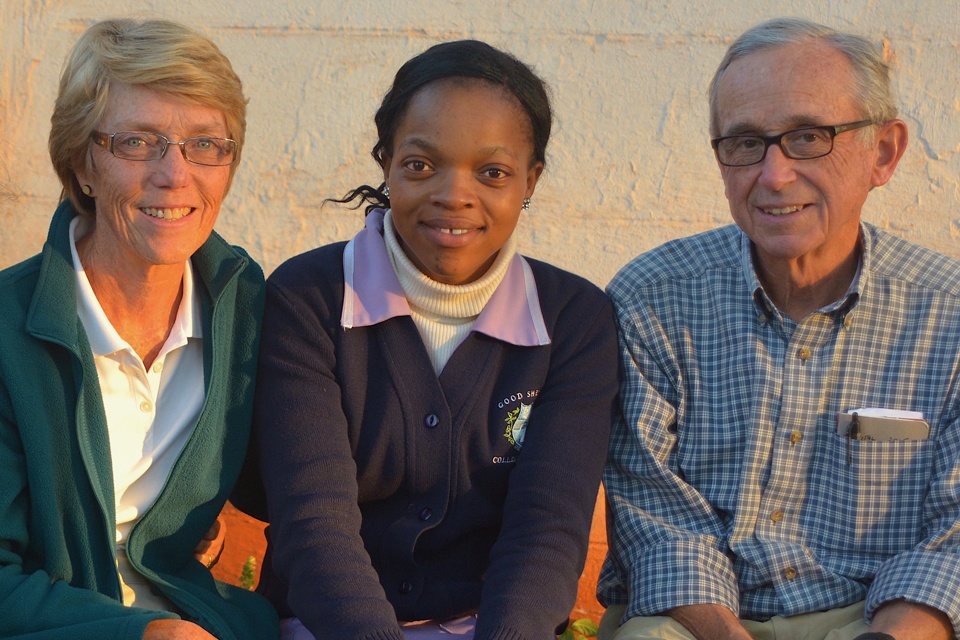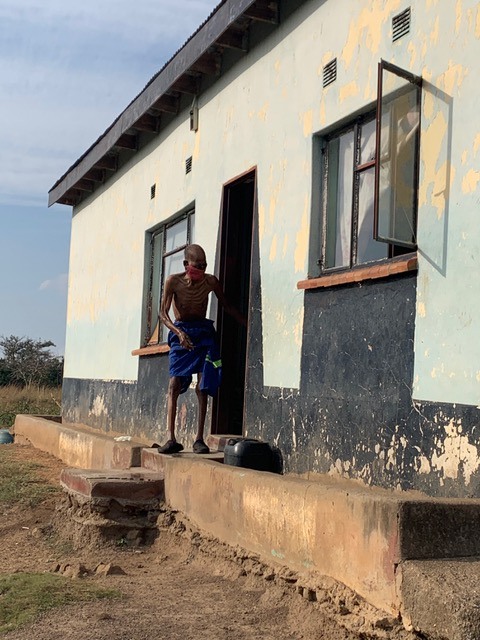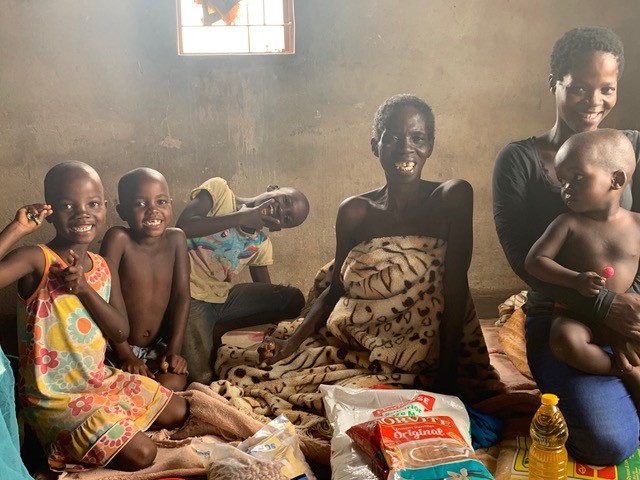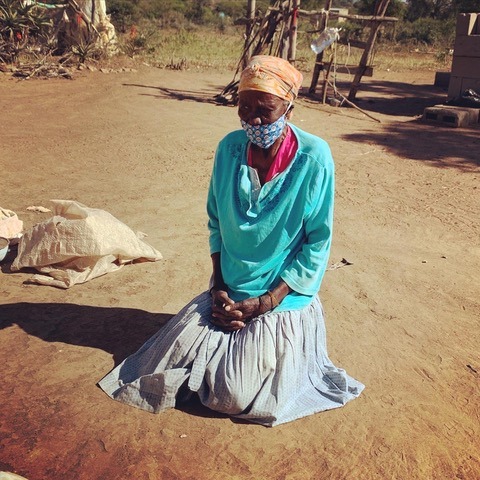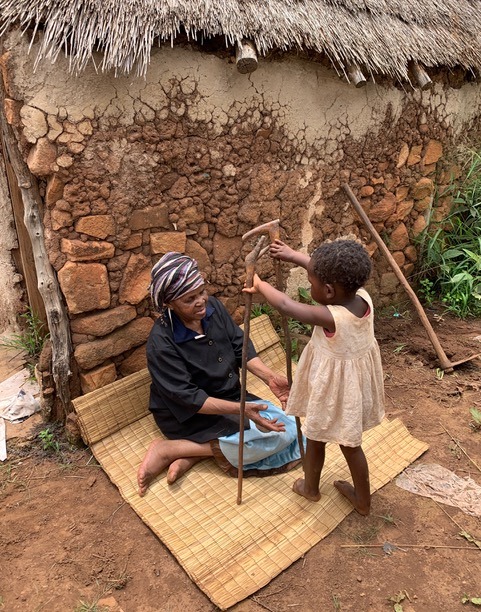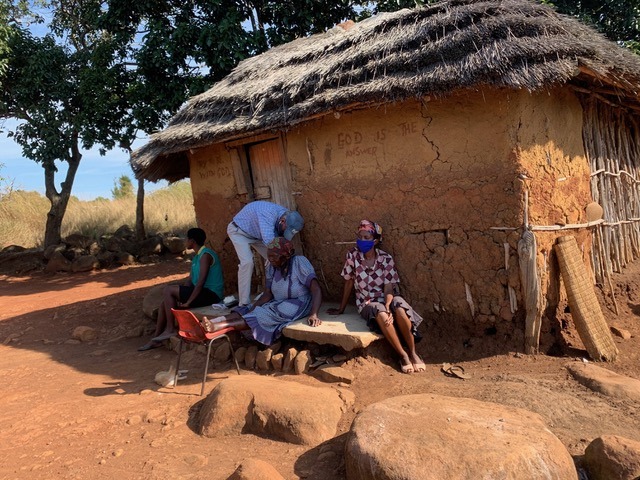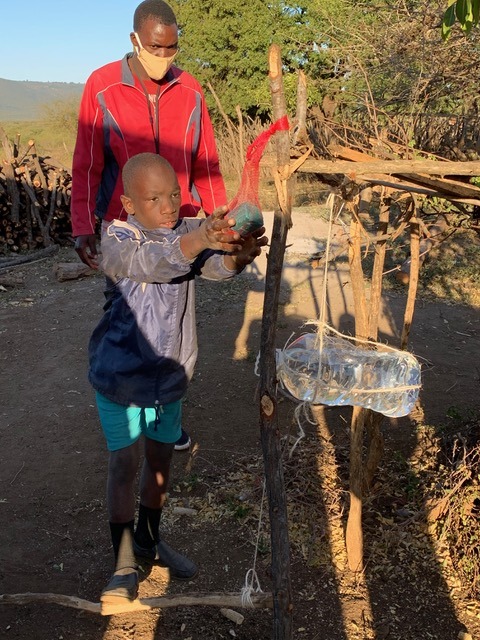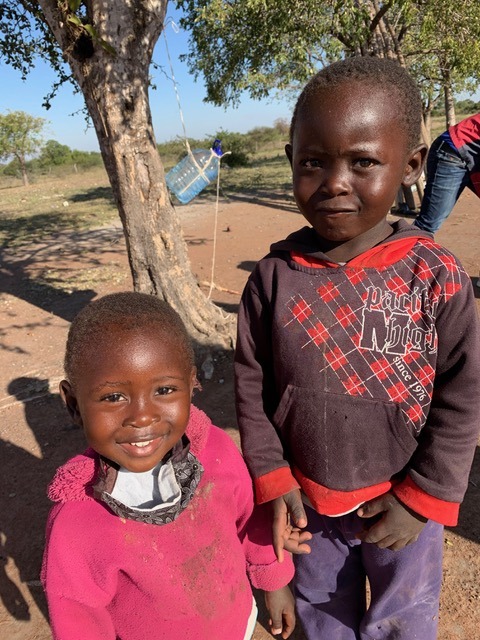Serving in Eswatini during COVID-19: An Interview with Kathleen and Dr. Al Hartmann
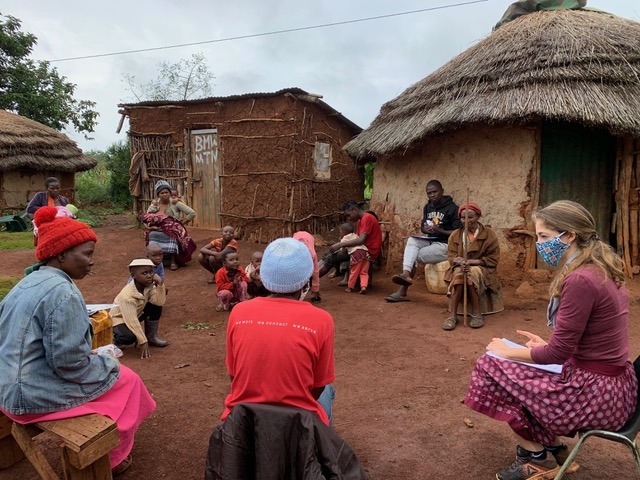
For nearly two decades, Kathleen and Dr. Al Hartmann have worked with the Good Shepherd Hospital in rural Eswatini (formerly Swaziland), delivering medical assistance to communities located on the periphery of care. When COVID-19 reached the country, their work became more critical than ever. In the interview below, the pair reflect on the challenges they faced, the inspirations that drove them, and the lessons they learned while serving during a global crisis.
Why is home-based care so critical during a global crisis like COVID-19?
COVID-19 came to Eswatini little later than it did in the United States, and it was not as intense at first. When we arrived at the end of June, there were maybe a couple hundred cases and a few deaths. But since we’ve returned home, the numbers have increased drastically.
Kathleen and Dr. Al Hartmaan with a nurse at Good Shepherd Hospital in Eswatini.
At the onset of the pandemic, Eswatini shut down quickly and all outreach work was paused—we were not allowed to go out to the homesteads. Many of our patients are immunocompromised and suffer from diseases like HIV or TB. On top of that, they have poor nutrition and little access to clean water. COVID-19 puts them at much greater risk, should they need hospitalization. Because of this reality, our ability to reach our patients at home became even more essential.
How did your work change as a result of the pandemic?
We shared our concerns and challenges with other NGOs (non-governmental organizations) in the area and partnered. We set up a COVID-19 education program with written materials and pictures so that those who were illiterate could also follow. We spent a long time at every homestead, teaching about COVID-19, explaining how it’s transmitted and why it’s important to wash hands and wear masks. We weren’t just handing out pamphlets, we were sitting down with communities and educating them.
We also addressed medical needs at the homesteads we visited. Rural health motivators found out about us and brought us to some of the poorest and sickest people in their area. So, we weren’t just helping our own patients but others as well. During our visits we brought hand washing materials, clean water, soaps, masks, and food packs for each homestead.
We can’t tell you how many people just fell apart and wept at the fact that they were getting real food. It won’t last forever, but it was much-needed help. We left them numbers to call if they became sick and instructed them on what to do if they developed symptoms. We became the Care Response Unit.
“We prayed with everyone before we left just so they knew we were in this together.”
How did the people you served react to the threat of COVID-19?
I remember one lady asking me, “Is it on me? Can I see it? Can I wash it off?” She had no idea. Another lady had a mask on and I asked, “Why are you wearing the mask and what do you understand about it?” She replied, “I don’t know. Somebody told me I needed to buy a mask.” There was a lot of misinformation and lack of information. They hung onto every word. We had the cleanest hands by the end of the day because we went to every homestead and showed them how important it was to wash their hands.
They appreciated every little thing we did. Not just because of the food but because somebody cared for them. They don’t expect anyone to care. For so long, that hasn’t been the case. Then all of a sudden, somebody shows up and takes an interest in their lives. It energizes them to get to another level. It was quite humbling for us.
In a resource diminished area, if someone gets really sick, they’re not going to make it. In contrast to the thousands of respirators in the United States, Eswatini may have three or four respirators in the whole country. So, prevention is essential.
What is it like to serve in a developing country during a global pandemic? Did you feel at risk?
We took all the right precautions and when you’re trained to do something, you just do it. I think we learned to accommodate the stresses over time. We’ve worked with TB patients for years during a time when there wasn’t as much equipment and precautions in place like there is for COVID-19 today. That helped put things into perspective for us.
How does the situation you experienced in Eswatini compare to what you’ve witnessed in the past?
When we first went in 2001, we witnessed the most emotionally devastating experience of our lives. HIV was taking the lives of everyone and there was no treatment—100 percent of infected people died. The opportunistic infections from AIDS were so horrific that I can’t even describe the things I saw. But everyone worked together and tried to do what they could. CMMB was a big help in that.
Even though there is no treatment for COVID-19, there is prevention. One of the most important parts of our work is what we teach on prevention. During the height of the HIV outbreak, speaking about the disease was looked down upon.
What’s frustrating about the situation today is that help is being pulled back from the people who need it the most. For instance, the chemotherapy program was halted just when Eswatini was seeing a positive response to cancer care. People with diseases other than COVID-19 aren’t getting the care they need.
In what other ways did COVID-19 impact those you served?
Communities aren’t as worried about COVID-19 here because they’re still living through HIV/AIDS, TB, malnutrition and uncontrollable diabetes. What’s most challenging for communities is the fact that people are losing their jobs because of the pandemic.
In African culture, the poor help the destitute. When somebody has a little and somebody has nothing, Africans seem to share the little they have. Now, the people that used to have a little are devastated because they’re losing their jobs and don’t have enough to share with others.
Poverty as we talk about it here in the United States is a number: If you are living on less than a dollar or a dollar and a half a day, that by definition, is poverty. But in Eswatini, poverty is when you see people who haven’t eaten for three days or are getting their water from a mud hole. That’s poverty and you can’t put a number on that.
One example we can share is about an elderly woman who lived alone in a small homestead. When we arrived, there was a foul smell. It was coming from rotten flour that had bugs and chips of wood in it. She was mixing it with water that was from a local dam. She was so hungry that she was trying to make it into little balls to boil and eat. When we gave her the food pack, she fell on the ground and wept. Then she stood up and pulled up her clothes to show us her body because she wanted us to see that she hadn’t eaten in so long and this was going to be real food. I don’t think I’ll ever forget that.
Has two-decades of volunteering changed your perspective at all?
The people have inspired us and changed our life. After all they go through, at the end of the day, they’re still smiling.
A lot of people don’t have a clue what the words “developing country” means in terms of what you have to go through to stay alive during a single, 24-hour day. We read about the statistics and poverty. We hear about people going without water or healthcare. But unless you see it up close, it doesn’t hit you and you move on to the next article in the newspaper.
When you see what people, who have the same feelings about life and family as us, go through on a daily basis, you wake up. It’s a real blessing to have had this opportunity in our lives. If we didn’t, we’d be reading about it in the New York Times, wondering what we could do instead of doing it.
People ask us, “There’s so much work to be done in the United States so why don’t you do it here?” The answer is yes, but fortunately, there are lots of people here already doing it. That’s not the case in developing countries.
“Thank God for CMMB because they were the right fit at the right time. They allowed us to do this.”
